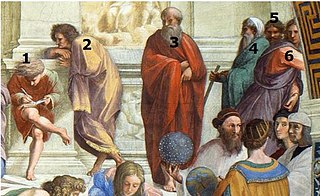In analytic philosophy, anti-realism is a position which encompasses many varieties such as metaphysical, mathematical, semantic, scientific, moral and epistemic. The term was first articulated by British philosopher Michael Dummett in an argument against a form of realism Dummett saw as 'colorless reductionism'.

Epistemology, or the theory of knowledge, is the branch of philosophy concerned with knowledge. Epistemology is considered a major subfield of philosophy, along with other major subfields such as ethics, logic, and metaphysics.
Foundationalism concerns philosophical theories of knowledge resting upon non-inferential justified belief, or some secure foundation of certainty such as a conclusion inferred from a basis of sound premises. The main rival of the foundationalist theory of justification is the coherence theory of justification, whereby a body of knowledge, not requiring a secure foundation, can be established by the interlocking strength of its components, like a puzzle solved without prior certainty that each small region was solved correctly.
Internalism and externalism are two opposite ways of integration of explaining various subjects in several areas of philosophy. These include human motivation, knowledge, justification, meaning, and truth. The distinction arises in many areas of debate with similar but distinct meanings. Internal–external distinction is a distinction used in philosophy to divide an ontology into two parts: an internal part concerning observation related to philosophy, and an external part concerning question related to philosophy.
In metaphilosophy and ethics, meta-ethics is the study of the nature, scope, and meaning of moral judgment. It is one of the three branches of ethics generally studied by philosophers, the others being normative ethics and applied ethics.
Philosophy of religion is "the philosophical examination of the central themes and concepts involved in religious traditions". Philosophical discussions on such topics date from ancient times, and appear in the earliest known texts concerning philosophy. The field is related to many other branches of philosophy, including metaphysics, epistemology, and ethics.

Skepticism, also spelled scepticism, is a questioning attitude or doubt toward knowledge claims that are seen as mere belief or dogma. For example, if a person is skeptical about claims made by their government about an ongoing war then the person doubts that these claims are accurate. In such cases, skeptics normally recommend not disbelief but suspension of belief, i.e. maintaining a neutral attitude that neither affirms nor denies the claim. This attitude is often motivated by the impression that the available evidence is insufficient to support the claim. Formally, skepticism is a topic of interest in philosophy, particularly epistemology. More informally, skepticism as an expression of questioning or doubt can be applied to any topic, such as politics, religion, or pseudoscience. It is often applied within restricted domains, such as morality, atheism, or the supernatural. Some theorists distinguish "good" or moderate skepticism, which seeks strong evidence before accepting a position, from "bad" or radical skepticism, which wants to suspend judgment indefinitely.
Philosophical skepticism is a family of philosophical views that question the possibility of knowledge. It differs from other forms of skepticism in that it even rejects very plausible knowledge claims that belong to basic common sense. Philosophical skeptics are often classified into two general categories: Those who deny all possibility of knowledge, and those who advocate for the suspension of judgment due to the inadequacy of evidence. This distinction is modeled after the differences between the Academic skeptics and the Pyrrhonian skeptics in ancient Greek philosophy. In the latter sense, skepticism is understood as a way of life that helps the practitioner achieve inner peace. Some types of philosophical skepticism reject all forms of knowledge while others limit this rejection to certain fields, for example, to knowledge about moral doctrines or about the external world. Some theorists criticize philosophical skepticism based on the claim that it is a self-refuting idea since its proponents seem to claim to know that there is no knowledge. Other objections focus on its implausibility and distance from regular life.
Moral skepticism is a class of meta-ethical theories all members of which entail that no one has any moral knowledge. Many moral skeptics also make the stronger, modal claim that moral knowledge is impossible. Moral skepticism is particularly opposed to moral realism: the view that there are knowable and objective moral truths.

Knowledge is a form of awareness or familiarity. It is often understood as awareness of facts or as practical skills, and may also mean familiarity with objects or situations. Knowledge of facts, also called propositional knowledge, is often defined as true belief that is distinct from opinion or guesswork by virtue of justification. While there is wide agreement among philosophers that propositional knowledge is a form of true belief, many controversies in philosophy focus on justification: whether it is needed at all, how to understand it, and whether something else besides it is needed. These controversies intensified due to a series of thought experiments by Edmund Gettier and have provoked various alternative definitions. Some of them deny that justification is necessary and suggest alternative criteria while others accept that justification is an essential aspect and formulate additional requirements.

The Critique of Pure Reason is a book by the German philosopher Immanuel Kant, in which the author seeks to determine the limits and scope of metaphysics. Also referred to as Kant's "First Critique", it was followed by his Critique of Practical Reason (1788) and Critique of Judgment (1790). In the preface to the first edition, Kant explains that by a "critique of pure reason" he means a critique "of the faculty of reason in general, in respect of all knowledge after which it may strive independently of all experience" and that he aims to reach a decision about "the possibility or impossibility of metaphysics." The term "critique" is understood to mean a systematic analysis in this context, rather than the colloquial sense of the term.
Subjectivism is the doctrine that "our own mental activity is the only unquestionable fact of our experience", instead of shared or communal, and that there is no external or objective truth.

Moral nihilism is the meta-ethical view that nothing is objectively morally right or morally wrong.
Pyrrhonism is an Ancient Greek school of philosophical skepticism which rejects dogma and advocates the suspension of judgement over the truth of all beliefs. It was founded by Aenesidemus in the first century BCE, and said to have been inspired by the teachings of Pyrrho and Timon of Phlius in the fourth century BCE. Pyrrhonism is best known today through the surviving works of Sextus Empiricus, writing in the late second century or early third century CE. The publication of Sextus' works in the Renaissance ignited a revival of interest in Skepticism and played a major role in Reformation thought and the development of early modern philosophy.

This glossary of philosophy is a list of definitions of terms and concepts relevant to philosophy and related disciplines, including logic, ethics, and theology.
Religious skepticism is a type of skepticism relating to religion. Religious skeptics question religious authority and are not necessarily anti-religious but skeptical of specific or all religious beliefs and/or practices. Socrates was one of the most prominent and first religious skeptics of whom there are records; he questioned the legitimacy of the beliefs of his time in the existence of the Greek gods. Religious skepticism is not the same as atheism or agnosticism, and some religious skeptics are deists.
Aenesidemus is a German book published anonymously by Professor Gottlob Ernst Schulze of Helmstedt in 1792. Schulze attempted to refute the principles that Karl Leonhard Reinhold established in support of Immanuel Kant's Critique of Pure Reason (1781). The title is a reference to Aenesidemus, an ancient Greek Pyrrhonist philosopher. Its complete title, in English translation, was Aenesidemus or Concerning the Foundations of the Philosophy of the Elements Issued by Professor Reinhold in Jena Together with a Defense of Skepticism against the Pretensions of the Critique of Reason.
Epistemology or theory of knowledge is the branch of philosophy concerned with the nature and scope (limitations) of knowledge. It addresses the questions "What is knowledge?", "How is knowledge acquired?", "What do people know?", "How do we know what we know?", and "Why do we know what we know?". Much of the debate in this field has focused on analyzing the nature of knowledge and how it relates to similar notions such as truth, belief, and justification. It also deals with the means of production of knowledge, as well as skepticism about different knowledge claims.

Academic skepticism refers to the skeptical period of the Academy dating from around 266 BCE, when Arcesilaus became scholarch, until around 90 BCE, when Antiochus of Ascalon rejected skepticism, although individual philosophers, such as Favorinus and his teacher Plutarch, continued to defend skepticism after this date. Unlike the existing school of skepticism, the Pyrrhonists, they maintained that knowledge of things is impossible. Ideas or notions are never true; nevertheless, there are degrees of plausibility, and hence degrees of belief, which allow one to act. The school was characterized by its attacks on the Stoics, particularly their dogma that convincing impressions led to true knowledge. The most important Academics were Arcesilaus, Carneades, and Philo of Larissa. The most extensive ancient source of information about Academic skepticism is Academica, written by the Academic skeptic philosopher Cicero.
Ajñāna was one of the nāstika or "heterodox" schools of ancient Indian philosophy, and the ancient school of radical Indian skepticism. It was a Śramaṇa movement and a major rival of early Buddhism, Jainism and the Ājīvika school. They have been recorded in Buddhist and Jain texts. They held that it was impossible to obtain knowledge of metaphysical nature or ascertain the truth value of philosophical propositions; and even if knowledge was possible, it was useless and disadvantageous for final salvation. They were specialized in refutation without propagating any positive doctrine of their own. Sanjaya Belatthiputta was one of the major proponents of this school of thought.